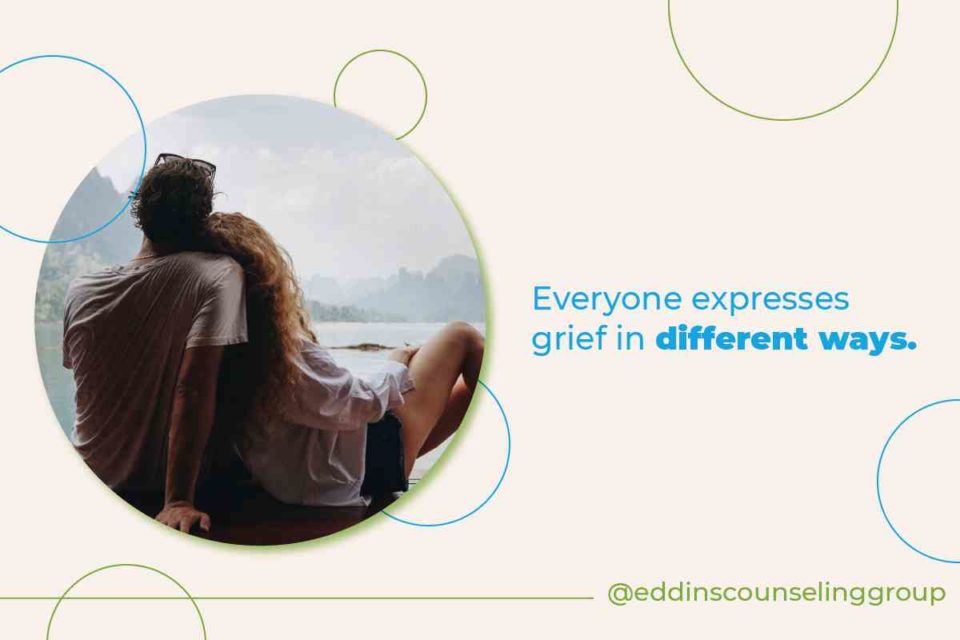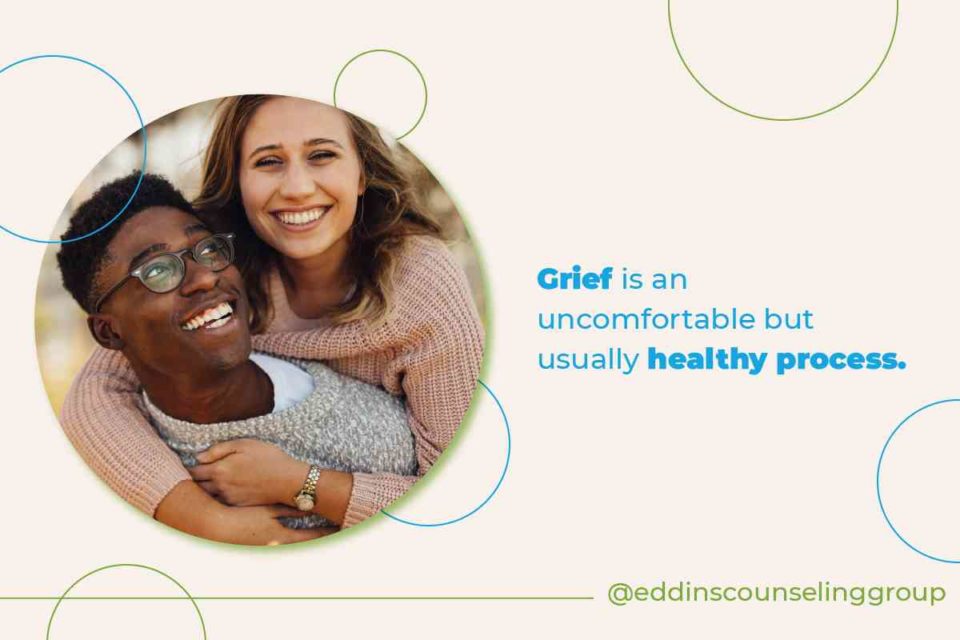November 7, 2022
8 Strategies for Handling Grief in a Marriage
Written by Guest Author
Posted in Trauma, Grief & Loss and with tags: grief and loss, marriage

The ability to overcome obstacles as a team is one of the best parts of marriage. And one of the most difficult things we face in life is the loss of someone we care about.
When grief strikes, it can have an impact on every aspect of your life, including (and perhaps especially) your marriage or relationship.
If you or your spouse is grieving the loss of a loved one, you may be wondering how grief will impact your relationship and how to protect the well-being of your marriage.
What Effects Does Grief Have on a Marriage?
You might first wonder how grief’s effects can manifest in a marriage. Here are a few shifts in your relationship that you should be on the lookout for or may have noticed already.
Lessening of emotional and physical intimacy
Withdrawal from emotional and physical intimacy is a very common side effect of grief. While grieving, you or your partner might not be interested in having sex or engaging in any form of physical intimacy. You might also find that you isolate yourself emotionally more.
But in some relationships, the opposite happens: as a result of your grief, you might feel more emotionally connected to your partner, or you might experience an increase in physical intimacy.
Getting on the same page is impossible
Every marriage experiences days when it’s impossible to communicate effectively. Grief, however, can intensify and increase the frequency of those days and moments.
You might feel that your moods, attitudes, and desires don’t match those of your partner. There may be more instances of misunderstanding and fewer “in-sync” moments.
Both of you may feel misunderstood and even lonely in your relationship as a result of this sense of being out of sync with your partner.
It’s critical to realize that this is a typical side effect of grief, whether only one of you is experiencing it or both of you have experienced a loss.
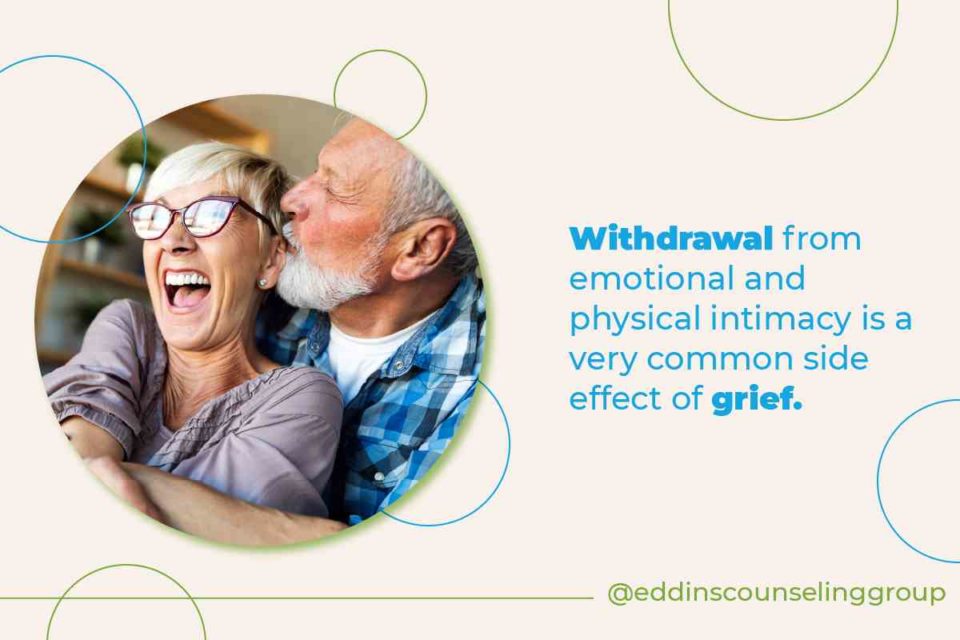
Molehills become mountains
Another difference you may notice in your relationship when grief is present is that minor disagreements become major issues, or vice versa.
Every marriage has minor squabbles, which you usually choose to ignore. You may have left your socks on the floor, or your spouse may have talked with their mouth full at dinner.
These minor issues are always present and somewhat bothersome, but when things are going well, they can fade into the background.
Grief can bring those minor issues to the surface. Your partner’s annoying eating habits or the socks on the floor seem like issues that need to be resolved immediately.
On the other hand, some couples experience the opposite. Because you may feel that “life is too short,” you may find yourself ignoring minor inconveniences that ordinarily would bother you.
Unexpected details about your partner are coming to light
You may have a new perspective on your spouse if this is the first time you have gone through grief as a couple. It’s possible that characteristics you never noticed before or that were previously in the background are now coming into focus.
In a relationship, this could either feel like a positive or a negative, and that could change from day to day. You might wonder, “Who is this person I’m married to?” on some days. Other days you might think, “You never cease to amaze me.”
How to Deal with Grief in Your Relationship: 8 Tips
What should you do if grief is causing these or other changes in your relationship? Here are eight strategies to keep your relationship strong even if one or both of you are grieving.
1. Respect their expression of grief
Everyone expresses grief in different ways. Even if your spouse expresses their grief in a very different way from how you do, their grief is still just as valid.
Respect your partner’s choice of how to express their grief, and be sure to acknowledge and validate any healthy coping mechanisms they may have.
2. Recognize that there is no timeline for grieving
If you believe that your partner has been grieving for “too long,” you may find yourself growing impatient with them. But there is no set period of time for grieving. It may come in strong ebbs and flows or diminish gradually over time.
Your partner might appear to be “over it” one day before “backsliding” the following. That doesn’t imply that they aren’t getting better or moving forward in their grief, though. They’re simply creating their own grieving timeline, which is normal and healthy.
3. Continue to reach out
Keep reaching out, physically or emotionally, if you or your partner have started to withdraw or isolate themselves from grief.
Even though it can be challenging at times, it’s crucial to maintain a certain level of physical and emotional closeness when one or both of you are grieving.
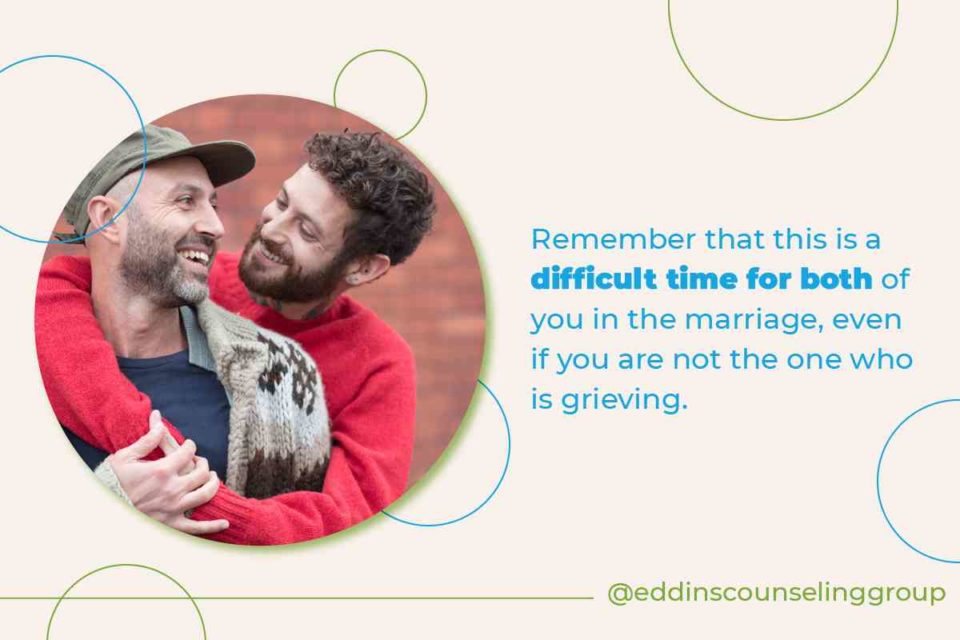
4. Put your support network to use
You might start to feel like you’re not getting all the support you require if you or your partner is grieving.
After all, you can’t expect to receive all the love, care, and support you require in life from a single person. Furthermore, expecting that of your partner is unfair, especially when there is a grieving component.
Whenever you or your partner is grieving, reach out to your friends, family, and other community members.
To feel supported and cared for during such a trying time, it’s crucial to spend time with them and talk things through with them.
5. Recognize that your emotions are legitimate.
Remember that this is a difficult time for both of you in the marriage, even if you are not the one who is grieving.
Being witness to the emotional trauma of someone you love is traumatic in and of itself. Give yourself some space and remember that it’s normal to feel off-balance while your spouse is grieving.
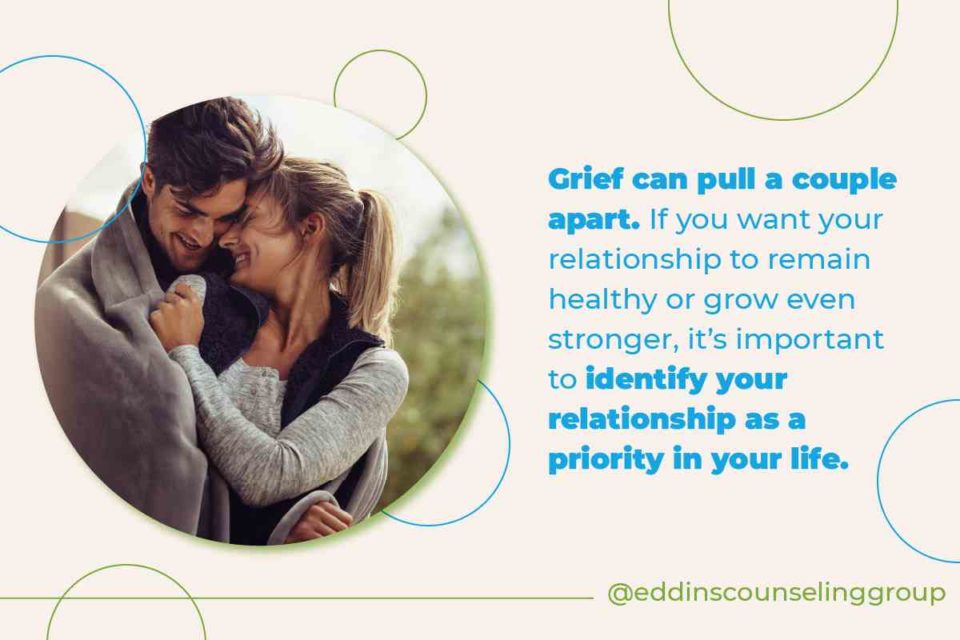
6. Treat each other with kindness first
Sometimes, it’s the simplest things that get overlooked when we’re grieving. That can include the basic principles we find important in life and in a relationship, such as being kind.
It can be easy to take your partner for granted when you’re going through a hard time. They’re your safety net, after all, and they’re there for you when you need them.
However, it’s essential to continue treating your spouse the way you would want to be treated. Even during an argument or disagreement, make sure you’re communicating with love and respect.
7. Prioritize your relationship
Grief can pull a couple apart, or it can bring them closer together. If you want your relationship to remain healthy or grow even stronger, it’s important to identify your relationship as a priority in your life. That means that sometimes, you may need to compromise on your own wishes for the betterment of your relationship.
You may feel a strong urge to pull away and spend more time alone, for example, but too much time alone can compromise your relationship. While it’s important to address your own needs and have them fulfilled, it’s also important to acknowledge and fulfill the needs of your relationship.
8. Embrace counseling as normal in your relationship
Whether you and your partner have previously discussed counseling or not, make a point of bringing it up in a friendly and encouraging way.
Help them realize that you two are not facing this situation alone, and that you would support their decision to seek professional counseling, whether they did so alone or with you.
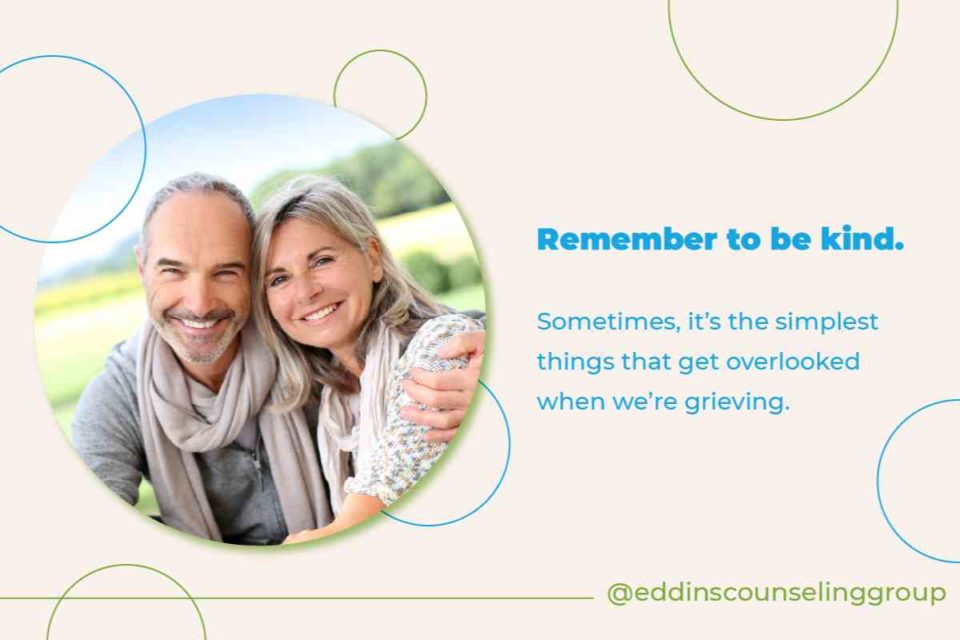
When to Seek Counseling for Grief
Grief is something that most people, and most long-term relationships, go through at some point. It’s an uncomfortable but usually healthy process, and it’s one that’s necessary to work through loss in a restorative way.
With that said, there are instances where grief can call for professional help. If you or your partner are experiencing any of the following, a professional counselor can likely help.
- You can’t imagine living without the person you lost. If you or your partner feel like there is no life worth living without the person you’ve lost, it’s important to seek counseling. Remember that although your life undoubtedly changed with the death of your loved one, your life did not end.
- You’ve stopped talking to each other. It’s normal and healthy to seek some alone time when you’re experiencing grief. But if you and your partner are feeling more like roommates than spouses, marriage counseling can help you identify the issues that exist and work through them.
- Grief hasn’t let up after one year. There’s no timeline for grief, and everyone experiences ups and downs. However, if your grief has been constant and overwhelming for a year or more, and it’s interfering with your quality of life or relationships, it’s likely time to seek care.
- You’re showing signs of depression. At first glance, depression and healthy grief can look a lot alike. And to complicate matters, grief can sometimes lead to longer-term depressive symptoms. But if you feel numb or have trouble experiencing a range of emotions, you may be suffering from depression.
Individual and Couples Counseling for Grief
You might be wondering how a professional counselor can help you and your partner work through grief. If you’ve never sought counseling before, the prospect can feel even more daunting. In general, here’s what you can expect from grief and bereavement counseling:
- Help expressing complex feelings. As a couple, you might be experiencing difficulty explaining how you feel to one another. If your spouse is grieving, you might feel a sense of guilt expressing any type of emotional need or struggle. A counselor can help you both find the words for how you’re feeling, as well as help you understand how the other spouse is feeling.
- Recognizing depression and complicated grief. Counselors have the training and experience needed to recognize the subtle differences between normal grief and something that’s becoming more severe. If you’re concerned that you or your partner are experiencing grief that isn’t healthy, or showing signs of depression, the best choice is to seek a professional opinion.
- Finding your identity alone and together. As humans, we understand our own identities through the relationships we have with others. You may see yourself as a daughter or son, a mother or father, a brother or sister, or a friend. If someone in your life has passed away, it can challenge that sense of identity. Counseling can help you understand how the loss has affected your sense of identity, either as an individual or as a couple.
Navigating Grief Together
Grief can reveal a lot about your partner and your relationship. In the end, it’s one of the life experiences that will deepen your understanding of one another and bring you closer together.
Time is one of the most crucial elements in grieving, whether it be for you, your partner, or both of you. You can weather the storm together and become even closer in your marriage with a little patience and understanding.

Next Steps
If you or your spouse are experiencing intense emotional pain due to a loss in your life, it may seem that the pain will never end. But it does get better. Take back control of your life with grief and loss counseling.
Give us a call at 832-559-2622 to find out more about Grief Counseling in Houston, Montrose, or Sugar Land. Or get started today with one of our Grief and Loss Counseling counselors today.
About our Guest Author
Sarah is a writer at JoinCake.com, an end-of-life planning website with free resources and information on how to estate plan and honor loved ones’ final wishes.
Posts You Might Also Find Helpful:
Grounding & Self Soothing
Get instant access to your free ebook.

